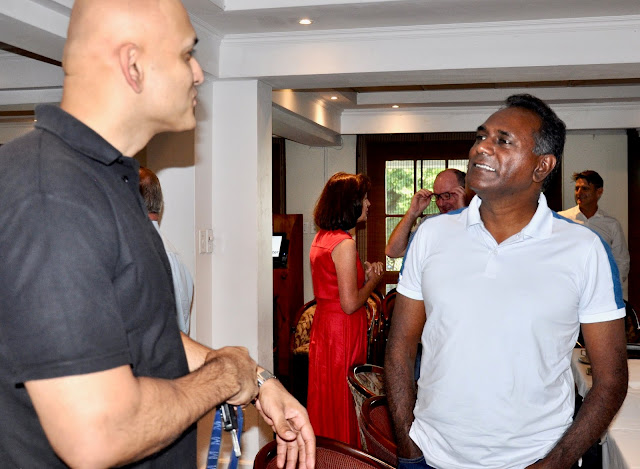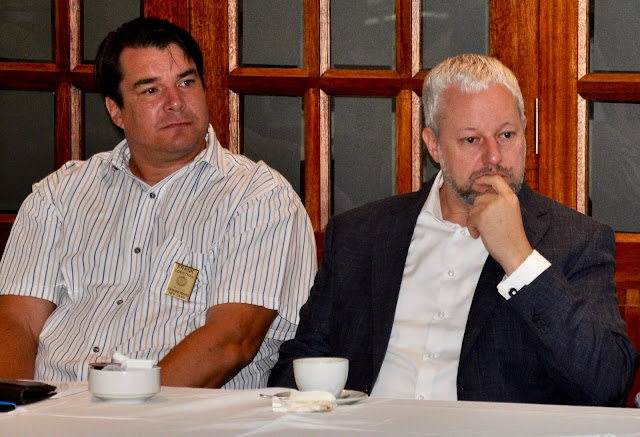Outa started off in 2012, after the football World Cup in South Africa in 2010, as the Opposition to Urban Tolling Alliance after the e-toll system to pay for major road upgrades to coincide with the historical sporting event, was suddenly sprung onto the people of Gauteng.
"Nobody knew anything about it," Wayne Duvenage, CEO of Outa, told the club last week.
In his outline of how and why Outa started, he said he was at the time CEO of Avis Car Rental and neither his company nor other car rental companies or organisations such as the Road Freight Association or the Automobile Association knew anything about the proposed scheme.
 |
| Wayne Duvenage explains how Outa began. Behind him is President Linda Vink and Ian Widdop while I listen intently |
The system of user-pay tolling had a direct impact on his business and with the help of other car rental companies and other businesses in the industry, they started asking questions about the feasibility of the project.
This soon became a serious investigation into the costs of the new and improved roads, for which far more was paid than the actual cost of the work. Sanral, he said, paid R18 billion for roads that should've cost R9 billion.
 |
| Incoming club president Paul Kasango thanking Wayne Duvenage |
Compliance in South Africa started off at 40% and is currently a mere 25%, which barely covers Sanral's costs.
The initial succesful court interdict against the e-toll system proved that civil society can challenge government, he said.
 |
| Bronwyn Tucker, a visitor, Debbie de Vries and others listening to Wayne Duvenage |
Outa then went to the media to appeal for funding from the public, with the aim of raising R1 million, the sum the legal firm that was dealing with the initial court application, wanted as surety against the state's appeal against the case that Outa had won. R3 million was raised within 48 hours.
He and others worked for free up until 2015, but they now have their own team of a senior advocate and seven lawyers, and in total 50 employees.
 |
| Jankees Sligcher, Amina Frense and others at the meeting |
"We try to mirror government departments in our research of corruption," Duvenage said.
They have also started investigations into local government failures.
"Over 63% of municipalities in South Africa have failed," he said.
A lot has happened on the anti-corruption front since Cyril Ramaphosa took over as president, he said, but the fight is far from over.
"Things are happening and the momentum is in the right direction. We are on the path to recovery, but it is a long path."
"We need civil society to be the conscience of government," he said, referring to the present-day Outa as "a corruption-fighting machine."
 |
| Llewellyn Leonard trying to persuade Tony Reddy that New Dawn would be the best club to join |
The guests, in no particular order, were soon-to-be-parents Adriaen Sligcher and Abigail Barrel, who have again pledged to become members of the club.
Also there was Bouke Hamminga, a colleague and friend of Jankees and Adriaen. Bouke is director for international sales and business development of Pas Reform and the Sligchers will soon be joining him and other employees at their head office in the Netherlands for the company's centenary celebrations.
Julian brought wife Debby Nagy and a friend, Mike Cadman, along. Mike is a journalist by trade and will be the speaker at the meeting on 20th March.
President Linda Vink brought her sister, Tina Stucke, and Koop Lammertsma to the meeting and we had a few other repeat visitors as well, starting off with Helene Bramwell. Her CV has been circulated to the board and club members and her fireside chat will take place after the meeting on Wednesday. We should be able to induct her the following week.
 |
| Sam Deverneuil, dad Graham Donet and dad-to-be Adriaen Sligcher at the meeting |
Tony Reddy paid a repeat visit to the club. He's looking for a home in Rotary and we hold thumbs that he and his wife, Caroline, choose New Dawn.
Speaking of new members, Hannes Dressler was a visitor, but has also expressed an interest in joining the club, so the meeting definitely doubled up as a membership drive.
 |
| Frank Odenthal with Hannes Dressler |
They were Ian Sinton, head of legal at Standard Bank, Sean Robinson, a director at Ultra Liquors (well patronised by a number of New Dawn members), Adrian Short, with his wife co-owner of the catering company By Word of Mouth, Dee Luksmidas, owner of Corpactive, a business consulting outfit, Rudolph du Plessis, a director of Trustgro Building Company and SJ Kok of Standard Bank Africa.
Thanks to Joan taking down all the details, we'll be sending the link to this blog to everyone on that list so that they can start feeling the pressure to do good deeds through Rotary.
And yes, we're talking to you. And you and you!
Please remember it's a business meeting this week.
A Thought for the Week: If everyone is thinking alike, then somebody isn't thinking. - George S. Patton (1885 - 1945)
No comments:
Post a Comment
Note: only a member of this blog may post a comment.